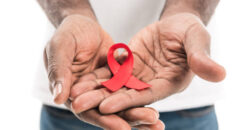
HIV testing is essential for couples. Drs. Rob and Karla Robinson (who also happen to be married) have taken the time to explain everything from how to open the dialogue of getting tested together to how to protect yourself against HIV in long-term relationships.
Drs. Rob & Karla Robinson have established The Urban Housecall Magazine, an online health and wellness magazine with health information for men, women and children as well as The Urban Housecall Radio Show to promote the message of health and wellness through the airwaves. So, we trust their judgment on the topic of HIV in relationships.
How does a woman up a dialogue with someone she’s dating about STDs and getting tested together?
Having the conversation about STDs and getting tested while dating should be brought up just as easily as the conversation about careers, marriage and the plan for children. Women engaging in sexual activity while dating need to also start planning for their sexual future, just like they would plan everything else in the future.
In reality, the best time to start this dialogue about sexually transmitted diseases and infections is in the beginning of the relationship before any sexual activity ever occurs. Women often make the mistake of having one of the most important conversations in a relationship well after there is an emotional attachment and when it is easier to therefore compromise on their beliefs.
A lot of women get infected in a serious relationship. What are the best things a woman can go in a serious relationship/marriage to stay safe and healthy?
Whether married, in a serious relationship, or in a casual relationship, women having sex are at risk of contracting HIV. Some of the most important steps to take in protecting yourself from HIV is to first of all know YOUR status. Make sure you are getting tested at least once a year or more depending on the number of sexual encounters. Next, make sure you know THEIR status. Have an open dialogue with your sexual partners before you engage in sexual activity and don’t be afraid to ask for proof. Lastly, be sure to take protection in your own hands. Sometimes women leave the responsibility of carrying condoms up to the man, but you can always be proactive about your sexual health and carry condoms yourself.

Why do you think Black women are afraid to be more vocal about HIV testing in relationships?
This is an issue that likely has many layers. It may be rooted in fear. Fear of losing their partner, fear of being perceived as promiscuous, or fear of being viewed as being accusatory of their mates. Unfortunately, discussing HIV testing can be an uncomfortable conversation, but still a very necessary one.
There’s an issue with men thinking it’s harder for them to contract HIV from a woman. Can you speak to that point?
Anatomically speaking, there is in fact a higher likelihood of transmission of HIV from men to women given the...
...depository nature of male-female sexual intercourse. However, it is still possible for a man to contract HIV from a woman, and it does happen. While the amount of surface area potentially exposed to the HIV virus is smaller for a man than it is for a woman during intercourse, anytime there is an exchange of bodily fluids the risk exists. Black men represent 70% of all new HIV infections in the black community. Men still need to protect themselves whenever engaging in sexual activity.
What are some ways that women can get over the roadblock of, “If you’re ok, then I’m ok, right?”
Women need to begin taking on the responsibility of sexual health for themselves. It is not enough to assume that “If you’re ok, then I’m ok, right?” KNOW that you are ok. With all of the rapid testing methods and the availability of testing centers in most communities, and even now the ability for at-home HIV testing, there is no excuse to not being in charge of your own sexual health.
Why do men resist testing?
There are a lot of reasons we don’t get tested. First of all, fear is a huge factor among men. We simply rather not know. There is an old adage, “what you don’t know, won’t hurt you.” However, in our community as it relates to HIV, “what we don’t know is killing us!” Another huge issue is the misconception that HIV only affects certain “high risk” groups like IV drug users or homosexual men and the stigma attached with it. Therefore, men feel if they are getting tested, it will be assumed we belong in one of these “high risk” groups. When in reality, HIV can affect anyone.
What can a woman do when a man is resistant to using a condom, especially in a committed relationship?
A woman has the power and should exercise the right to be in control of her sexual health. If her man is resistant to using a condom, she can be resistant to agreeing to sexual activity. Years ago there used to be a saying “No glove, no love.” We need to feel empowered to take control in protecting ourselves and our health, even if it means saying no.









